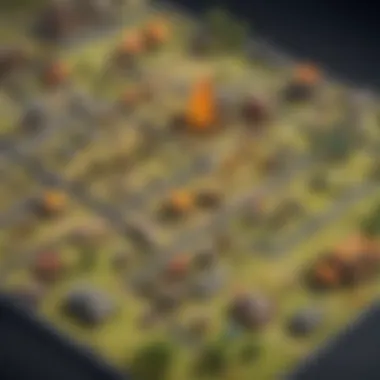Unveiling the Intriguing World of Strategy Games Resembling Clash of Clans


Product Overview
When delving into the realm of strategy games like Clash of Clans, a meticulous examination of their key elements becomes imperative to understand player engagement thoroughly. From resource management to strategic warfare tactics, these games offer a unique blend of challenges that captivate the minds of avid gamers seeking virtual thrills.
Performance and User Experience
In the world of strategy games like Clash of Clans, performance and user experience reign supreme. Testing and evaluating the seamless integration of player strategies within the game's mechanics is integral. The user interface plays a pivotal role in immersing players in a world where every decision impacts their virtual empire. Comparing the gameplay mechanics with similar titles in the market sheds light on the innovative approach of each game.
Design and Build Quality
An in-depth analysis of the design elements in strategy games like Clash of Clans unravels the intricate details that shape the player's experience. The materials used in creating the virtual landscapes contribute to the overall aesthetics and durability of the game. Ergonomics play a nuanced role in how easily players can navigate through the complexities of strategic decision-making.
Technology and Innovation
Exploring the technological advancements and unique features in games like Clash of Clans reveals groundbreaking innovations. These features have a ripple effect on the gaming industry, influencing future trends and developments in similar titles. Understanding the potential impact of these innovations on the gaming landscape is crucial for tech-savvy individuals and early adopters seeking the next frontier of virtual gameplay.
Pricing and Value Proposition
When considering the pricing and value proposition of strategy games like Clash of Clans, affordability and competitiveness come into focus. Comparing the value offered by these games with their competitors unravels the intricacies of their pricing strategies. Recommendations based on an analysis of the gaming experience provide a final verdict on the overall worth of investing time and resources into these strategic endeavors.
Introduction
Welcome to the realm of strategy games, a burgeoning landscape where intellect meets entertainment, and tactical prowess reigns supreme. In this article, we embark on a thrilling journey of exploration centered around the captivating universe of games like Clash of Clans. As technology continues to advance and game development reaches new heights, the allure of strategy games remains ever-present, drawing in a diverse array of players seeking mental stimulation and strategic challenges in virtual realms.
From the calculated moves in battles to the intricacies of base-building, strategy games offer a unique blend of cerebral engagement and immersive gameplay experiences. For enthusiasts of tactical thinking and decisive action, delving into the realm of strategy games is not merely a pastime but a fulfilling intellectual endeavor. By dissecting the core elements that define these games and the strategic nuances that elevate gameplay, we aim to unravel the underlying mechanisms that make titles like Clash of Clans so engrossing for a discerning audience.


Throughout this exploration, we will navigate through the evolution of strategy games, analyzing their impact on cognitive abilities, and delving into the future trends that are poised to shape the landscape of strategic gaming. Buckle up as we delve deep into the strategic expanse of virtual conquests, where every decision carries weight, and every move shapes the future. Prepare to immerse yourself in a world where wit triumphs over might, and strategic brilliance paves the path to victory.
Understanding Strategy Games
Strategy games hold a significant position in the world of gaming, providing players with challenges that test their tactical and strategic thinking abilities. In this article focusing on strategy games like Clash of Clans, understanding the nuances of these games becomes paramount. By delving into the complexities of strategy games, players can grasp the intricate game mechanics and strategic depth that make these games intriguing. Exploring the reasons behind the popularity of strategy games can shed light on the appeal of virtual challenges where decision-making and planning play crucial roles.
Definition of Strategy Games
Strategy games are a genre of games where players are required to make decisions to achieve specific objectives within a competitive environment. These games often involve resource management, building infrastructures, and engaging in tactical combat. Players must strategize and plan their moves to outwit opponents and accomplish in-game goals. Strategy games come in various forms, including real-time strategy (RTS), turn-based strategy (TBS), and tower defense games, each offering unique gameplay mechanics and challenges.
Evolution of Strategy Games
The evolution of strategy games traces back to early board games like Chess and Go, where strategic thinking and foresight were crucial for victory. Over time, strategy games have evolved with advancements in technology, transitioning into digital forms like video games. From the simplistic gameplay of early strategy titles to the complex simulations of modern strategy games, the genre has seen remarkable growth. The evolution of strategy games reflects how gaming preferences have shifted towards intellectually stimulating experiences that combine entertainment with strategic thinking.
Clash of Clans: An Overview
Clash of Clans holds a predominant position in the realm of strategy games, captivating players with its blend of resource management, base building, and strategic combat. It is a mobile game that allows players to construct and upgrade their village, train troops, and engage in battles with other players in real-time. The game's appeal lies in its intricate balance between offense and defense, where players strategize to protect their resources while also raiding and pillaging other players' villages. Clash of Clans offers a competitive environment where alliances are formed, strategies are devised, and mastery of tactics is essential for victory.
Gameplay Mechanics
In-Game Strategies
Community and Competition
Key Features of Strategy Games
Strategy games encompass a myriad of captivating elements that engage players in immersive gameplay experiences. These games are designed to stimulate strategic thinking and decision-making skills while offering a complex and dynamic virtual world to explore. Players must navigate through various challenges, employing tactics and foresight to achieve victory. One of the key features of strategy games is resource management, which involves efficiently allocating and leveraging in-game resources to progress and grow. Effective resource management is crucial for sustaining gameplay and overcoming obstacles, adding a layer of depth to the gaming experience.


Resource Management
Resource management is a fundamental aspect of strategy games, influencing every decision and action taken by the player. Players must judiciously collect, store, and utilize resources such as gold, elixir, or troops to build their virtual empire or army. Efficient resource management is essential for balancing expansion, defense, and offense strategies. It requires strategic foresight and planning to ensure a consistent supply of resources for sustained growth and development. Moreover, resource scarcity or mismanagement can impede progress and hinder the player's ability to compete effectively.
Building and Expansion
Building and expansion are core components of strategy games, allowing players to construct and upgrade structures, fortifications, and units within the game world. Each building or upgrade contributes to the player's overall strategy, enabling them to enhance their capabilities, strengthen defenses, or unlock new features. Building placement and expansion strategies directly impact gameplay dynamics, influencing interactions with other players and AI opponents. Successful building and expansion require a balanced approach that considers resource availability, strategic goals, and potential risks. Players must continually adapt their building plans to meet evolving challenges and maximize their strategic advantage.
Combat and Tactics
Combat and tactics form the crux of strategy games, requiring players to engage in battles, skirmishes, or wars to achieve their objectives. Strategic thinking, adaptive planning, and tactical decision-making are essential for success in combat scenarios. Players must deploy troops strategically, exploit enemy weaknesses, and coordinate attacks to outmaneuver opponents and claim victory. Understanding unit strengths and weaknesses, terrain effects, and battle mechanics are crucial for devising effective combat strategies. Moreover, players often need to adapt their tactics on the fly, responding to enemy movements and emergent threats to secure triumph on the battlefield.
Psychological Aspects of Strategy Gaming
In the realm of strategy gaming, understanding the psychological aspects holds utmost importance. These elements delve deep into the cognitive processes involved in decision-making, long-term planning, and risk assessment. Psychological aspects provide players with a unique opportunity to hone their mental skills, enhancing their strategic thinking and problem-solving abilities. Engaging with strategy games like Clash of Clans not only offers entertainment but also serves as a platform for psychological growth and development.
Decision-Making Skills
Decision-making skills play a pivotal role in strategy gaming. Players are constantly faced with choices that impact their in-game progression and outcomes. Assessing situations, weighing options, and making sound decisions under pressure are fundamental aspects of honing decision-making skills in strategy games. As individuals navigate through complex scenarios within the game environment, their ability to make strategic choices improves, transcending virtual boundaries to real-life applications.
Long-Term Planning
Long-term planning in strategy games involves setting goals, outlining strategies, and foreseeing future developments. Players need to think ahead, anticipate challenges, and formulate effective plans to achieve success in the game. By engaging in long-term planning, individuals cultivate patience, perseverance, and the ability to adapt to changing circumstances. This aspect of strategy gaming mirrors real-world scenarios, where foresight and strategic decision-making are essential for attaining objectives.
Risk Assessment


Assessing risks is a critical component of strategy gaming, where every move comes with potential consequences. Players must evaluate the risks associated with their decisions, considering both short-term gains and long-term implications. By mastering risk assessment in the virtual realm, individuals sharpen their analytical skills, learn to strategize effectively, and become adept at calculating probabilities. This aspect of strategy gaming translates into a valuable skill set applicable in professional settings and personal life, emphasizing the significance of measuring risks before making strategic moves.
Impact of Strategy Games on Cognitive Abilities
Strategy games, like Clash of Clans, are not just about entertainment; they serve as mental exercises that can significantly impact cognitive abilities. Engaging in these games requires players to utilize various skills that can enhance their mental acuity and problem-solving capabilities. By immersing oneself in the complex worlds of strategy games, individuals can sharpen their decision-making skills, improve long-term planning abilities, and enhance their risk assessment capabilities. These games provide a platform for players to strategize, think critically, and make informed choices, all of which are essential for cognitive development.
Problem-Solving Skills
One of the key cognitive benefits of playing strategy games like Clash of Clans is the improvement of problem-solving skills. Players are often faced with intricate challenges that require strategic thinking and innovative solutions. By tackling these obstacles within the game, individuals can enhance their ability to analyze situations, identify patterns, and implement effective strategies to overcome hurdles. The gameplay mechanisms in strategy games prompt players to think critically, evaluate multiple options, and adapt their tactics based on changing circumstances, thereby fostering a proactive approach to problem-solving.
Critical Thinking
Critical thinking is another vital cognitive skill that strategy games help to cultivate. Players engaging with games such as Clash of Clans are constantly required to evaluate information, assess risks, and make decisions that have consequences within the virtual world. This dynamic environment encourages individuals to think analytically, consider various perspectives, and anticipate outcomes based on their actions. Critical thinking in strategy games involves examining the implications of different choices, weighing the pros and cons of each strategy, and developing a coherent plan that aligns with overarching objectives. By honing their critical thinking skills in gaming scenarios, players can extend these capabilities to real-world situations.
Strategic Planning
Strategic planning is a fundamental aspect of strategy games that directly impacts cognitive abilities. Games like Clash of Clans demand that players devise long-term strategies, manage resources efficiently, and anticipate future challenges to achieve success. Strategic planning in gaming entails setting clear goals, allocating resources strategically, and adapting strategies based on opponents' moves. Through continuous engagement with the game and the iterative process of refining strategies, players can enhance their ability to plan ahead, think strategically, and make calculated decisions that align with their objectives. The intricate balance of short-term actions and long-term goals in strategy games fosters skill development in strategic planning that can be transferred to real-life scenarios.
The Future of Strategy Gaming
Upon delving into the intricate world of strategy gaming, it becomes evident that envisioning the future of this genre is pivotal. The evolution and advancement of strategy games play a transformative role in shaping the gaming landscape, catering to the increasing demand for sophisticated gameplay experiences. Exploring the future of strategy gaming allows us to grasp the essence of technological innovation and innovative trends that drive the industry forward.
Technological Advancements
In the realm of strategy gaming, technological advancements serve as the cornerstone for revolutionizing gameplay dynamics. From enhanced graphics rendering to immersive virtual reality integration, technology continues to redefine the boundaries of gaming experiences. The utilization of artificial intelligence and machine learning algorithms further augments the strategic depth of gameplay, offering players a more sophisticated and responsive gaming environment. Embracing technological advancements in strategy games propels the genre into a realm of limitless possibilities, captivating players with unparalleled levels of realism and engagement.
Emerging Trends
As strategy gaming continues to evolve, several emerging trends shape the future landscape of the genre. The rise of mobile gaming platforms, coupled with cross-platform compatibility, fosters a more inclusive gaming community. Additionally, the fusion of strategy elements with other genres such as role-playing games or simulation further diversifies gameplay mechanics, appealing to a broader audience. Virtual interconnected worlds and cloud-based gaming facilitate seamless multiplayer experiences, fostering collaboration and competition on a global scale. Understanding these emerging trends provides insight into the direction in which strategy gaming is heading, reflecting a dynamic and ever-evolving industry.
Social and Competitive Aspects
Beyond technological advancements and emerging trends, the social and competitive aspects of strategy gaming play a vital role in shaping its future trajectory. Online multiplayer functionalities enable players to engage in strategic battles with friends or compete against formidable opponents worldwide. The integration of social features like chat functions and guild systems fosters a sense of camaraderie and teamwork among players, enriching the gaming experience. Furthermore, the evolution of esports and competitive gaming leagues amplifies the competitive aspect of strategy games, turning them into arenas for skillful tactics and strategic prowess. Embracing the social and competitive facets of strategy gaming cultivates a vibrant and interactive community, paving the way for a future filled with exciting gaming possibilities.



